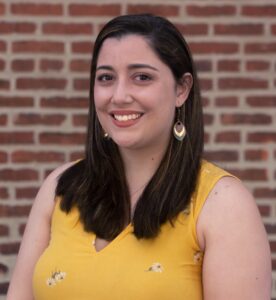
Since the beginning of the pandemic, almost every health reporter I’ve talked with has experienced both the professional thrill of writing about an unfolding science story and the personal feelings of fear, anxiety and grief about the virus. The energy that it takes to stay on top of this relentlessly evolving story and manage our own emotions has led to reporter burnout. For this “How I Did It,” one journalist, newer to the health care beat, shares how she’s been coping.
Chelsea Cirruzzo, a health and local news reporter for Axios, began utilizing social media in college to elevate her voice as a journalist. She used Twitter to help find sources and gained a following of almost 15,000. But as the pandemic has worn on, Cirruzzo has decided that for her own well-being, she needed to limit her activity on Twitter. Finding that boundary, among other decisions, is helping her manage burnout.
You made reference on social media to burnout in covering the pandemic. I think a lot of journalists share this feeling. How did you manage these emotions while covering this story?
I think it just kind of came in waves, where it was like, ‘Oh, no, this is really scary.’ And then, ‘Vaccines are coming! This is exciting.’ And then, you’re seeing that these same iterations of inequities [and people] who are not getting what they need just based on where they live, how old they are, and what race they are. The story [repeated] itself over and over again. But [at the same time], I think it’s so important and I wanted to do these stories. It was a lot to write about and a lot to handle. On top of that, we all had our own things going on. I live with a teacher, and I have health concerns and was worried about my family. So, it was tough.
In March of this year, I wrote about the challenges health reporters have faced during the pandemic for Nieman Reports and found out many of my colleagues had similar feelings of exhaustion and burnout. But also, some were dealing with challenges I haven’t faced: Some of them lost loved ones to COVID-19. Asian American reporters, not just health reporters, faced racist attacks because of anti-Asian rhetoric being pushed by the former president. It’s hard for health reporters to remove themselves from the story right now because the pandemic has hurt everyone, so how do you continuously cover something that has become so personal?
I certainly experienced some of those emotions and the need for a break. So how did you overcome that? Did your news organization provide support, or did you find it in other places?
I took time off. I went to therapy, and I talked to my doctor. I did all the stuff you’re supposed to do when you’re feeling like this. Honestly, the most helpful [thing] was [having] a supportive partner and supportive friends who were there for me. A piece of advice I always give other journalists is: [make] friends [with people] who are not in journalism because my [non-journalist] friends know what I do but don’t know [how] I spend my day. I was between jobs at least twice during the pandemic, and at least one of those times, I took a month off. I was fortunate to be able to do that. I saved up my money for that…and it was really good. I hesitate to say that vacation or taking time off is the cure for burnout because I think [there needs to be] more of an industry-wide change. [But] not working and being able to turn away from the constant churn [of news] was helpful. I felt really refreshed when I returned to work. I was ready to get going again.
How much is social media creating this sense of burnout? Is that what made you decide you’re going to take a little bit of a break from Twitter?
Social media is something that you need to be part of as a journalist. I graduated [from college] in 2017. A lot of my professors [believed] everything you [do on Twitter] has to be super professional and buttoned-up, but I never subscribed to that. I was really into being personable and showing my personality a little bit. I talked about ‘The Bachelor’ or I would talk about restaurants I really liked.
I’d go to a festival and talk about how that was really fun. It was just like getting involved and having conversations with other people in my community. I was reading a lot of other journalism stories in D.C. and interacting with reporters that I liked and interacting with people about things happening in their neighborhood. It really helped me become a better reporter [because] I got to know people. Then, when the pandemic came, I was able to stay in touch a lot easier [than I otherwise could have.] It started to build this platform [for me]. It was exciting.
I was starting out as a reporter, and I had 1,000 Twitter followers and then 2,000 and then 3,000 and it just kept going. I [thought], ‘This is awesome. There are all these people I can talk to.’ I found sources very easily because I knew if I tweeted, people would share it. It made reporting easier in that way. But then, in the past year, it [was] just like I came to the top of the roller coaster, and I looked out and I [thought] ‘Wow. Like there’s a lot of me out there.’ And I was struck how often, when I met someone in person [who] I had only interacted with online, they would say, ‘Oh, I feel like I know you.’ But they didn’t know me. I’m a little bit shy and a little bit quieter offline.
So, as a reporter, I felt like it just didn’t make any sense anymore to be on Twitter as much. I felt like it was distracting me from what I wanted to be doing as a reporter. I felt all this pressure to be personable, fun and cool all the time. But it’s not really who I am. On top of that, being a woman on the internet, the harassment is just really out of control.
It’s a question of balance, right? How do you both build a following but not get caught up in it?
It’s complicated because it certainly did get me where I am today. Many people have offered me freelance gigs because of the platform I was able to build. It’s really hard for me to tell people, now, ‘No. I don’t tweet’ because the pressure is real. Not everyone has the ability to log off, so I hope we will continue to talk about finding balance and relieving pressure.
What were some of your favorite resources (other than Twitter) from the past year for finding story ideas and experts to interview?
Well, [besides] the Association for Health Care Journalists, the USC Annenberg Center for Health Journalism has been really helpful with workshops. I also have turned to organizations, like Study Hall (an online collective for freelancers and journalists) where I meet other journalists and mentors [for support]. I’ve also found Mandy Hofmockle’s [Substack] newsletter for journalists really helpful.
What was it like to be on the public health beat since the beginning of the pandemic?
Coming into the pandemic, my focus was largely on Medicare and Medicaid, and I was covering nursing homes. I had an early sense that things were going really wrong when nursing homes started to shut down. Over time, I expanded my focus from Medicare and Medicaid [to every part of the health system] and then it became evident that vaccines were coming and that was going to be the big story. It was this hopeful [story to cover] …and that was kind of an exciting time, to cover the vaccine rollout. I covered doctors and nurses who were the first ones to get the vaccine and then nursing homes. And then, of course, the challenges that were particularly prominent… [for example] it was so hard for a lot of people to find appointments…and all these [health] inequities that you were seeing for the past year, continue to widen with the vaccine rollout.
Were inequities the most taxing to witness?
There was a lot that was really tough to witness. I started talking to a lot of people with long-haul COVID and that was really painful. It’s like any of this can happen to anyone. We all think we’re invincible. But even if we have a mild case of COVID, there’s this potential that you could not feel great six months from now. So, I was talking with a lot of people who were my age, in their 20s, who are most certainly not okay. It was sobering.
You mention that the industry needs to change in terms of helping journalists with burnout. Can you talk more about that?
As an industry, I don’t think we spend a lot of time protecting ourselves from [burnout] or protecting one another from it. I think about this a lot when I see job descriptions that say: ‘Come work in an exciting newsroom if you have a hunger for stories.’ That’s wonderful and all, but people just aren’t like that all the time.
When will we, from the top down or as a collective unit, say,‘That’s enough’? ‘You need to take some time off’? Or, ‘Let’s get you on a story that’s a little bit less emotionally taxing’? And it’s hard because we feel like we want to cover all these stories. I don’t know if there’s an answer, but I think that it [should] come from the overall industry as opposed to the person [having] to take the time and [figure out what] they need.
Check out AHCJ’s September webcast on reporter burnout, with tips and resources.









